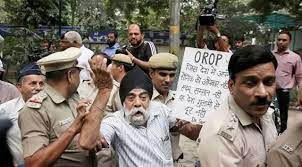NEW DELHI: As the government failed to pay One Rank, One Pension (OROP) arrears to retired armed forces personnel within the time limit fixed by it under a 2022 judgment, the Supreme Court on Monday set fresh deadlines for clearing the dues in a staggered manner after the Centre highlighted financial difficulties faced by it.
A Bench led by Chief Justice of India DY Chandrachud asked the Ministry of Defence (MoD) to pay the Rs 28,000 crore OROP arrears for 2019-2022 to various categories of pensioners between April 30, 2023, and February 28, 2024. “The Union Government is duty-bound to comply with the judgment of this court in the terms of the OROP scheme,” said the Bench which also included Justice PS Narasimha and Justice JB Pardiwala.
The top court directed that the six lakh family pensioners and gallantry award winners “will be paid their OROP dues by April 30, 2023,” while around four to five lakh retired servicemen aged 70 years and above shall be paid their OROP dues in one or more instalments by June 30 this year.
The OROP dues for 10-11 lakh remaining pensioners shall be paid in three equal instalments by February 28, 2024, it said. On behalf of ex-servicemen, senior counsel H Ahmadi demanded that interest should be paid on the delayed arrears, but the Bench turned it down.
Out of 25 lakh pensioners, four lakh did not qualify for the OROP scheme as they were getting enhanced pension, the Bench noted.
While dealing with the Indian Ex-Servicemen Movement’s plea, the Bench clarified the payment of the dues “will not affect further equalisation of pension of ex-servicemen to be done in 2024”. Citing financial difficulties faced by it, the Centre had sought extension of time to clear OROP dues.
The Bench – which had on March 13 asked MoD not to take law into its own hands and to immediately withdraw its January 20 notification on payment of OROP arrears in four instalments — refused to accept a sealed cover note on the payment of OROP arrears submitted by Attorney General R Venkataramani.
“We need to put an end to this sealed cover practice in the Supreme Court… This is fundamentally contrary to the basic process of fair justice…I am personally averse to sealed covers. There has to be transparency in court… This is about implementing orders. What can be secret here,” the CJI told Venkataramani.


